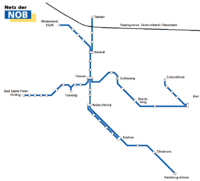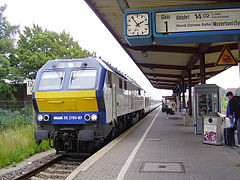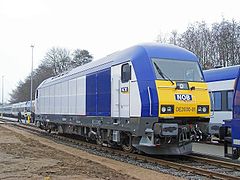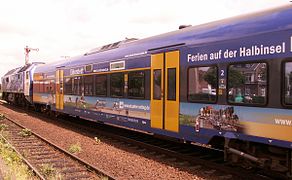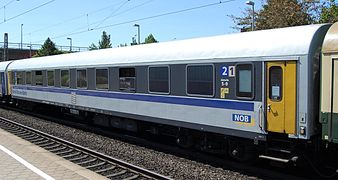Nord-Ostsee-Bahn
| Nord-Ostsee-Bahn GmbH | |
|---|---|

|
|
| Basic information | |
| Company headquarters | Husum |
| Web presence | Nord-Ostsee-Bahn |
| Reference year | 2011 |
| owner | Transdev GmbH |
| Managing directors | Martina Sandow |
| Transport network | VRK , HVV |
| Employee | 350 |
| sales | 95,000,000 euros (2011) |
| Lines | |
| Gauge | 1435 mm ( standard gauge ) |
The Nord-Ostsee-Bahn GmbH (NOB short) is a regional bus company, which operates the city buses in Bad Segeberg and to the regional bus companies Rohde transport companies and Niebüller transport companies involved. Until December 31, 2013, the Nord-Ostsee-Bahn also operated urban transport in Itzehoe and Glückstadt , which is now operated by Vineta Steinburg . The company is based in Husum . It is 100% owned by Transdev GmbH and operated local passenger transport on the Marsh Railway in Schleswig-Holstein until the 2016 timetable change. In the absence of a current regional rail transport contract, the NOB currently only provides public transport services in the form of bus services via the two subsidiaries Rohde Verkehrsbetriebe with operations in Husum and Eutin and North German transport operations with operations in Niebüll and Itzehoe.
The turnover in 2011 was 95 million euros and the passenger performance was around 10.2 million (including subsidiaries).
At the 2016 timetable change, the Nord-Ostsee-Bahn had to hand over its last route to the Schleswig-Holstein regional train .
history
Rail transport
The liberalization of local rail passenger transport in Germany made it possible for the railway company Connex to enter German rail transport. Following a tender by the state of Schleswig-Holstein, the subsidiary Nord-Ostsee-Bahn was awarded the contract and took over local passenger transport on the Kiel – Husum , Husum – Bad St. Peter Ording routes and half of the Kiel– Neumunster .
Subsequently, the company tried to obtain a rail license on the car transport route between the Niebüll and Westerland (Sylt) stations ( Sylt shuttle ). The planning failed in 2003 after DB Autozug did not grant access to the loading terminals. The flat cars intended for traffic were sold.
After the bankruptcy of the railway company FLEX , the NOB also took over the local rail passenger transport on the Hamburg - Flensburg - Pattburg / Padborg ( Denmark ) route, the Flensburg Express, from November 2003 to December 2005, following a price request from the State of Schleswig-Holstein . There were Dispoloks the 182 series and locomotives of the 185 series used. In addition, there were former InterConnex cars.
The jump to the second largest railway company took place on December 11, 2005. At the time when the timetable changed, the NOB took over the local rail passenger transport on the Marschbahn ( Hamburg-Altona - Westerland / Sylt ) previously operated by DB Regio . For this purpose, a separate plant was built in Husum . After initial problems with the shuttle train, the new cars the company Bombardier and the diesel locomotives of the type MAK DE 2700 (formerly Siemens ME 26), the operation had returned to normal on the Marschbahn to January 2006 again. The measured punctuality was again in the range of other competitors in Schleswig-Holstein. Many problems have been resolved since the takeover of the company, but up to April 2007 there were repeated disruptions, which are then increasingly publicized. The Nord-Ostsee-Bahn attributed a large part of the delays to route damage and maintenance measures on the infrastructure, which are the responsibility of Deutsche Bahn. As a result of the "false start" on the march in December 2005, the management level of the NOB was partially replaced. The previous managing director Karl-Heinz Fischer took on a new function within the group. In January 2006, then Veolia Verkehr appointed Steffen Höppner, who at the time was already Head of Region East, as Managing Director and new Head of Region North. In the middle of 2006, Hagen Kalleja was appointed as a further managing director of NOB. After Steffen Höppner was appointed Chief Operating Officer (COO) of the former Veolia Verkehr in April 2007, he resigned his position as NOB managing director in mid-2008 after concluding the arbitration negotiations with the state of Schleswig-Holstein. Since then, Hagen Kalleja has been the sole managing director of the NOB. Since the spring of 2009, the management team has been formed as a dual leadership from Hagen Kalleja and Olaf Ernst as technical director. At the end of 2009, Hagen Kalleja was dismissed as managing director and replaced by Andreas Winter. After a transition period, Andreas Winter was followed by the former managing director of Ratzeburg-Möllner-Verkehrsbetriebe, Martina Sandow.
From the collective bargaining negotiations in winter 2010/2011, the Marschbahn operated mostly only every two hours according to a partial timetable. As of February 2011, the Schleswig-Holstein regional newspaper SHZ counted 17 strikes by the train drivers' union GDL . The end of the regular outstanding payments was only possible with the agreement on an arbitrator on November 4, 2011.
In the meantime, the company had agreed with the rival company DB Regio on a partial early transfer of operations on the Husum – Schleswig – Rendsburg – Kiel route. With the timetable change in December 2011, a large part of the NOB routes were transferred to the DB Regio company in the course of the tender in the North Network . Since then, the Nord-Ostsee-Bahn has only operated on the Marschbahn .
In July 2015, it was decided by the Finance and Economic Committee of the Schleswig-Holstein Landtag that the Nord-Ostsee-Bahn had to transfer the service of the Marschbahn to the DB Regio Schleswig-Holstein at the 2016 timetable change . According to the state government, DB Regio is said to have submitted the most economical offer for the regional transport company. The transport service is provided with the vehicles that are already in use on the Nord-Ostsee-Bahn. These are owned by the financial investor Paribus from Hamburg and are leased to the respective operator of the route for the duration of the transport contract. In November 2016, one month before the end of the transport contract and the handover of the route to DB Regio, a routine inspection revealed serious damage to the couplings of a married-pair wagon. After such damage was found on other couplings as well, all 90 wagons in operation at the NOB were temporarily shut down until they were repaired. Until the change of operator in December 2016, emergency services with rental vehicles and sometimes buses were set up. As the new operator of the Marschbahn, DB Regio had committed to taking over the wagons and had to put together replacement material at short notice for the timetable change, for which older wagons from all over Germany were used. According to a report, Deutsche Bahn is considering a claim for damages against the NOB.
Bus transport
In January 2004 the majority of the bus company Niebüller Verkehrsbetriebe GmbH (NVB) was taken over. In the further course of the year, the Nord-Ostsee-Bahn took over the Husum-based bus operator Rohde Verkehrsbetriebe at the turn of the year 2005/06 .
From January 1, 2006, Nord-Ostsee-Bus GmbH, which was founded by NOB as a bus holding company, took over urban transport in the cities of Itzehoe and Glückstadt under the brand name Steinburger Linien . The takeover was preceded by a Europe-wide tender by the local public transport association Steinburg, which the previous operator die-linie GmbH was unable to win again. Vineta Steinburg has been operating the lines of the former Steinburger Linien since January 1, 2014 .
Since 2013, the Nord-Ostsee-Bahn has also been operating city bus services in Bad Segeberg .
Lines
The following SPNV lines were operated by the Nord-Ostsee-Bahn:
| Train type | Route name | Line route | Contract term | vehicles | |
|---|---|---|---|---|---|
| former lines | |||||
| RE | Marching track | Hamburg-Altona - Elmshorn - Itzehoe - Heide (Holstein) - Husum - Westerland | 12/11/2005 - 12/10/2016 | ER20 / MAK-DE 2700 / BR 245 +6 (= 3 * 2) or 10 (= 5 * 2) married pair cars | |
| RB | Itzehoe - Wilster - Heide (Holstein) | LINT 54 | |||
| Husum - Niebüll - Westerland | |||||
| SHE | Railway line Hamburg-Altona – Kiel / railway line Neumünster – Flensburg | Hamburg Hbf - Elmshorn - Neumünster - Rendsburg - Schleswig - Flensburg - Padborg | 11/1/2003 - 12/10/2005 | Class 182 Dispo, later 185, with ex InterConnex-Z car and control car | |
| RB | Hamburg-Altona – Kiel railway line | Neumünster - Bordesholm - Kiel Hbf | 11/05/2000 - 04/04/2009 | LINT 41 | |
| RB | Marching track | Niebüll - Tondern | 2003 - December 11, 2010 | NE 81 | |
| RB | Husum – Kiel railway line | Husum - Schleswig - Rendsburg - Kiel main station | 11/05/2000 - 12/10/2011 | talent | |
| RB | Husum – Bad St. Peter-Ording railway line | Husum - Tönning - Sankt Peter-Ording | |||
| RB | Kiel – Flensburg railway line | Kiel Hbf - Eckernförde | 04/04/2009 - 10/12/2011 | LINT 41 | |
Since the timetable change in 2016, the NOB has no longer operated scheduled rail traffic. After several lost tenders, it had to hand over all routes to Regionalbahn SH . In the last months of 2011, the Schleswig-Holstein regional train already drove part of the route. Due to foreseeable redundancies due to operational reasons for the timetable change, the NOB had already lost a large number of employees, which forced it to gradually hand over operations to the future operator.
Vehicle fleet
The Nord-Ostsee-Bahn had a large number of its own and leased or rented vehicles and wagons of various types in use. The vehicles were serviced in the Husum depot .
Railcar

The NOB owned nine LINT 41 multiple units (VT 301 – VT 309) and three Talent multiple units (VT 728 – VT 730), which have since been given to other companies in the Transdev Group. An NE 81 operated on the Niebüll - Tønder route from April 2003 to December 2010 and was bought by the Württembergische Eisenbahn-Gesellschaft . Since the timetable change in 12/2015, regional rail services (RB) have been provided with new railcars of the LINT 54 series in the new color scheme of the Schleswig-Holstein local transport network .
Locomotives
Locomotives and railroad cars were purchased for operation on the so-called Marschbahn, some of which were also used by the NOB before.
NOB has currently rented four diesel-electric MAK DE 2700s from Vossloh . Three diesel-electric Eurorunner 20 (DE 2000-01 to 2000-03) belonged to the NOB until the timetable change 12/2015, but were transferred to the Mitteldeutsche Regiobahn in Saxony within the Transdev group . In addition, the NOB had rented several ER 20s from Siemens Dispolok , which were sold to Beacon Rail Leasing Limited , the vehicles are now rented from Beacon Rail Leasing Limited . Three further ER 20s from ÖBB were rented until October 2006 (2016 041 to 2016 043). Four electric locomotives of the 146 .2 series (146 519 to 146 522) were also acquired by the NOB, were given up within the group and are used in freight traffic.
Two Köf IIIs (335 106 and 143), leased from northrail GmbH , took over for shunting operations at the Husum depot.
In 2015, 15 new diesel-electric locomotives of the type TRAXX P160 DE ME were delivered, which were ordered by the regional transport company and are rented to the current operator of the Marschbahn. The locomotives are owned by the paribus group, and the locomotives are maintained by northrail GmbH . The locomotives run under the numbers 245 201 to 245 215 and are painted in the new blue / white design of NAH.SH.
Because of a design flaw, the new locomotives tend to overheat. At the beginning of June 2016, trains had to stop several times on the open track until the transformers had cooled down again. The locomotives triggered fire service operations as early as 2015.
DE2000-01 of the Nord-Ostsee Bahn GmbH in the Husum depot
Class 245 in Hamburg Hbf ready to go to Westerland .
Passenger cars
At its peak, the NOB had a total of 110 passenger cars . Of these, 90 wagons (so-called “married pair wagons”) were leased from HSH N Sylt-Express AB, a subsidiary of HSH Nordbank in Stockholm, earmarked for operation on the Marschbahn. In June 2012 the car pool was put out to tender because the leasing company wants to withdraw from the business. The state of Schleswig-Holstein has given these wagons an operational guarantee for their remaining useful life of 19 years, which is why DB Regio had to take over the leasing contract as the subsequent operator of the Marschbahn. All of these 90 married pair cars were parked inoperable due to damage to the couplings. The remaining 20 wagons from the former Flensburg Express , which emerged from the former InterConnex 3, were still available .
Flensburg Express car
The Flensburg Express cars were in use between Hamburg and Padborg until the 2005 timetable change. This traffic on the route was taken over by the NOB in 2003 and is considered one of the reasons for the discontinuation of the InterConnex 3, as the cars are now to be used for the Flensburg Express. Until November 1, 2015 they drove on the march from time to time and extended the normal six-car trains to ten cars or were used as reserves or amplifiers . The cars are UIC-Z compartment cars and large-capacity control cars . Since the 2015/16 timetable change, the cars have been used together with class 223 locomotives between Leipzig and Chemnitz.
Married pair car
90 so-called married pair wagons were procured from Bombardier Transportation for passenger transport on the Marschbahn . This designation is associated with a special train composition concept in which a pair of wagons always forms a fixed unit. The wagon pairs are made up of a supplementary medium wagon, connecting wagon or control car and a supply medium wagon. Since a control car is always required at one end of the train and a connection car at the other end, the smallest train unit consists of four cars (control car + intermediate supply car + intermediate supply car + connecting car). In between, an extension by a pair consisting of a utility wagon and a supplementary wagon is always possible. Usually the trains at the NOB consist of six cars.
The supply intermediate cars have devices with which the second pairing car is also supplied. These are a multi-purpose compartment with folding seats in the low-floor area and a toilet. The supplement trolley has the same multi-purpose compartment but does not have a toilet. Control cars, supplementary medium cars and supply medium cars are all second class. Because the cars are connected to one another via special couplings, there is a special connecting car that, like the control car, has a standard screw coupling . Following the cart there are the service compartment of the train driver and the train conductor and the first class. The cars are technically a one-story variant of the double-deck car type built by Bombardier . The NOB was the only railway company that used this type of vehicle. According to the legal requirements, all cars are non-smoking cars. In December 2015, the wagons were taken over by Paribus Capital , which also owns the locomotives. Since DB Regio has been the operator of passenger transport on the Marschbahn since December 2016 , the wagons were also taken over by them.
In November 2016, after a clutch cracked and other cars had abnormalities, all 90 cars were taken out of service. Replacement traffic with trains from other companies and with buses proved difficult due to a lack of capacity.
According to the inspection by TÜV, the cause was increased corrosion of coupling parts and an error in the main inspection in 2012/2013.
From April 2017, the wagons that showed no damage to the couplings were gradually put back into operation. After repairs, all 90 cars will be available again at the end of 2017.
Married pair control car (left) in Husum train station
literature
- Frederik Naumann: The Nord - Ostsee-Bahn - a regional provider . In: Eisenbahn-Revue International , issue 5/2004, pp. 234–239, ISSN 1421-2811 .
- Gerd Wolff: Deutsche Klein- und Privatbahnen, Volume 13: Schleswig-Holstein 2 (western part) . EK-Verlag, Freiburg 2012, ISBN 978-3-88255-672-8
Web links
Individual evidence
- ↑ Change of timetable: NOB disappears from the public after 16 years . In: NahverkehrHAMBURG . December 12, 2016 ( nahverkehrhamburg.de [accessed February 9, 2017]).
- ↑ Notification No Connex-Sylt-Shuttle . In: Eisenbahn-Revue International , issue 7/2003, ISSN 1421-2811 , p. 297.
- ^ NOB press release of March 21, 2006
- ↑ SHZ report from October 20, 2011 ( page no longer available , search in web archives ) Info: The link was automatically marked as defective. Please check the link according to the instructions and then remove this notice.
- ↑ http://www.nahverkehrhamburg.de/fahrplanwechsel-nob-verschwindet-nach-16-jahren-aus-oeffentlichkeit-7616/
- ↑ MRCE press release of July 16, 2015
- ↑ Delays caused by hot locomotives on the Nord-Ostsee-Bahn. In: Welt Online . June 3, 2016, accessed June 3, 2016 .
- ↑ Burning locomotive stops train traffic from Hamburg to Westerland. Hamburger Abendblatt, November 11, 2015, accessed on June 5, 2017 .
- ^ Paribus - NOB - DB AG . In: railway magazine . No. 6 , 2017, ISSN 0342-1902 , p. 30 .
- ↑ NOB wants to fix problems by Friday
- ↑ Nah.SH reacts to criticism from Niebüll, Sylt + der Pendler
- ↑ The first married pair cars are back on the road . In: railway magazine . No. 6 , 2017, ISSN 0342-1902 , p. 30 .
- ^ Ralf Henningsen: Marschbahn. You are back. Sylter Rundschau , April 7, 2017, accessed on April 10, 2017 .
- ↑ The first married pair cars are back on the road . In: railway magazine . No. 6 , 2017, ISSN 0342-1902 , p. 30 .
Coordinates: 54 ° 18 ′ 58.4 " N , 10 ° 7 ′ 56.2" E
